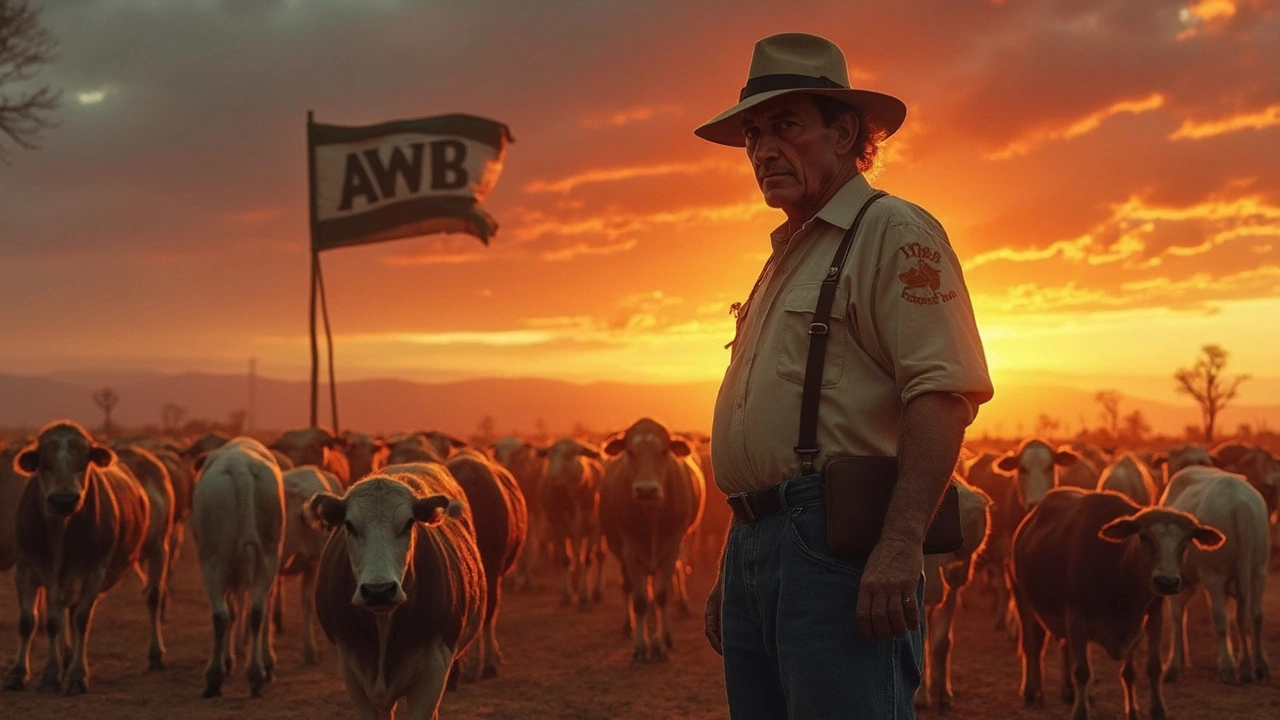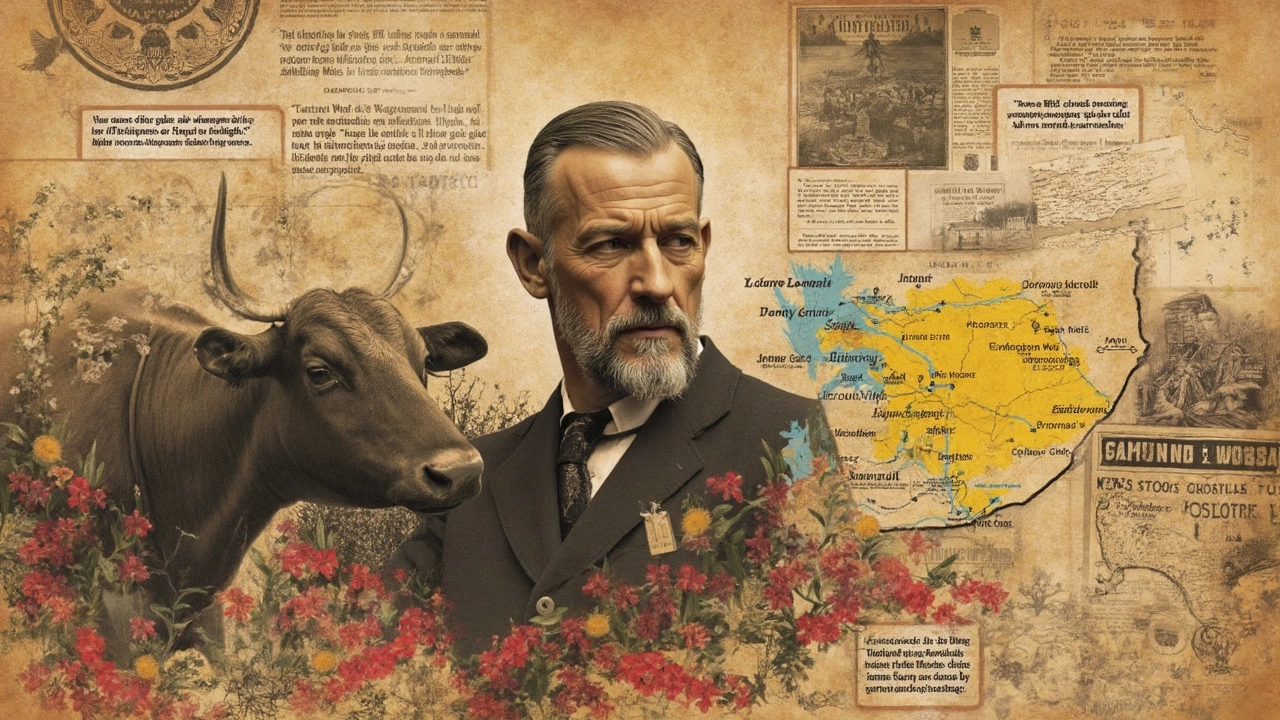
Steyn von Rönge, a name that might stir a bit of curiosity or even strong opinions in South Africa, is not just any farmer. Balancing life between running his farm in the Free State's Zastron district and leading the Afrikaner Weerstandsbeweging, he's got quite a full plate. This isn't your average farmer tale, but rather a swirl of politics, heritage, and a pinch of controversy.
Born in 1955, von Rönge is knee-deep in South African farming heritage, being a third-generation cattle farmer. His life's journey took a notable turn when he joined the AWB back in 1983—an organization with a far-right stance. Fast forward a few decades, and he found himself at the helm of the AWB after the tragic murder of its founder, Eugene Terre'Blanche.
- The Man Behind the Name
- Leadership Transition
- Political Views and Agendas
- Controversies and Challenges
The Man Behind the Name
To really understand Steyn von Rönge, it's crucial to dive into his background and where he comes from. We're talking about someone who has deep roots in South Africa's Free State province, a region known for its wide-open farmlands and tight-knit farming communities. Born in 1955, he was the product of a farmer's life from day one. His parents, George Napier van Ryneveld and Elsie Catharina, passed down not just their farming skills but also a rich Afrikaner heritage.
Steyn grew up in the Zastron district, where farming really runs in the blood. By the time he finished at Zastron High School in 1972, he was already groomed for a life on the land. But he didn't stop there. He pursued higher education and snagged a bachelor's degree at the University of the Free State, which gave him a broader perspective beyond the farm.
His experience wasn't just limited to academic fields. He served in the South African Air Force, which might seem like a curveball for a farmer's life, but his role as a physical education instructor there built up some discipline and leadership skills.
Jumping forward a decade or so, in 1983 during a time of political ferment, Steyn decided to join the Afrikaner Weerstandsbeweging (AWB), probably more a reflection of his strong beliefs in Afrikaner nationalism. His decision wasn't just about the politics; it was a personal journey that aligned with his views about protecting his community and heritage.
Leadership Transition
When it comes to leadership, the path that Steyn von Rönge took within the AWB is nothing short of dramatic. He didn't just stumble into the top spot; it was a calculated move, backed by the organization's founder, Eugene Terre'Blanche himself.
In early March 2010, Terre'Blanche was facing health issues and designated von Rönge as the interim leader, with the decision documented in a rather unconventional but legally binding way—a signed fax. The idea was to have von Rönge step up temporarily while Terre'Blanche recovered from heart surgery. Life, however, had other plans.
When Terre'Blanche was murdered in April 2010, the AWB faced a major crisis. Von Rönge, already seen as the next in line, had to fill big shoes, and he did so in what many might call a baptism by fire. The murder was not just a leadership issue but a major event that sent ripples throughout the Afrikaner nationalist community and beyond.
From Deputy to Leader
Before taking over, von Rönge was already making waves as the deputy leader. He had been a part of the AWB since 1983, a time when the political climate in South Africa was tense, to say the least. He rose through the ranks, known for his firm stance on Afrikaner nationalism—a vision of a segregated homeland that still resonates with some.
Gaining trust in such turbulent times was no small feat. Von Rönge had to be a solid presence, showing that he could handle internal conflicts while keeping the organization's main goals in focus.
Challenges and Determination
Leadership isn't just about titles, and von Rönge knows that well. Taking over the AWB meant rallying the members and pushing forward his vision in a post-apartheid society. He faced criticism from various ends, not only from opponents of the AWB but from within the organization. Change of this magnitude doesn't happen without friction.
His main agenda remains centered around securing a segregated white homeland and improving safety for Afrikaner farmers—issues that touch on deep-rooted fears and historical grievances. Balancing these sensitive topics while leading a far-right group is a complex task, one that he navigates with a mix of tradition and his own brand of modern leadership.
Steyn von Rönge’s leadership transition wasn't just about taking over a title or position; it was about inheriting a legacy and steering that legacy amidst changing times. His journey from a cattle farmer in Zastron to leading a significant (and controversial) nationalist movement is a testament not only to his determination but also to the complexities of South African politics.

Political Views and Agendas
When it comes to Steyn von Rönge and his political views, things get heated pretty quickly. As the leader of the Afrikaner Weerstandsbeweging (AWB), his vision is squarely focused on establishing a segregated white homeland in South Africa. This idea isn't just a passing thought—it's at the heart of the AWB's mission and something von Rönge has been pushing since he took over the reins in 2010.
Steyn's push for a white homeland stems from a deep-seated belief in Afrikaner nationalism. It's all about creating a space where the Afrikaner culture and values can flourish without outside interference. This idea harks back to earlier movements in South African history where ethnic identities have often clashed.
The Security Agenda
Another high-priority item on von Rönge's to-do list is farmer security. Considering the backdrop of land reform debates and farm attacks in South Africa, it's no surprise. He wants more robust security measures in place to protect farmers, who, in many cases, feel vulnerable to violent attacks. To von Rönge, securing these farms is as essential as establishing the homeland itself.
But let's be honest—these views have stirred plenty of controversies. Critics argue that such agendas only serve to divide the nation further, while supporters believe it's about preserving a cultural identity in the midst of change. It's a balancing act between cultural heritage and the country's broader objectives.
Maintaining Leadership
One of the more challenging aspects for von Rönge is gaining broader support, not just from within Afrikaner communities but across other groups in South Africa. The AWB's reputation and extreme measures make this a tough sell. Despite these challenges, von Rönge remains unwavering in his pursuits.
In the end, understanding Steyn von Rönge's political views requires a look back at both the historical and cultural contexts in which they emerged. It's a complex web of beliefs, ambitions, and controversies that continue to stir up debates across South Africa.
Controversies and Challenges
When it comes to Steyn von Rönge and his leadership of the AWB, controversies aren't just side notes—they're at the very heart of this chapter in South African politics. Leading a far-right group in a country that's steeped in a complex racial history is not for the faint-hearted, and von Rönge undoubtedly faces a trail of obstacles.
One major sticking point is his advocacy for a segregated white homeland, a view that's met with strong opposition. For many South Africans, it echoes a painful past. His critics argue that his vision is unrealistic in a modern era striving for inclusivity. Yet, his followers believe it's a necessary measure for their community's survival.
Security for farmers is another hot topic, not just a political talking point. Incidents of farm attacks have escalated, creating a climate of fear. Von Rönge has been vocal about strengthening security measures for farmers, a stance that resonates deeply with his core supporters but provokes heated debate nationwide.
Public Perception and Media
Public opinion is a mixed bag. While some see von Rönge as a defender of traditional Afrikaner values, others view him through the lens of radicalism. Media portrayal often leans towards critical, sometimes branding the AWB under von Rönge as out of step with South African democracy's progress.
Internal and External Pressures
Internally, keeping the AWB's ranks united and motivated hasn't been smooth sailing. The group has experienced internal dissent over strategies and direction, especially post-Terre'Blanche. Externally, political and social pressures constantly test the movement’s resilience.
For a clearer picture, here's some data on public opinion regarding the AWB under von Rönge:
| Opinion | Percentage |
|---|---|
| Support AWB's mission | 28% |
| Oppose AWB's mission | 54% |
| Neutral/Undecided | 18% |
Ultimately, von Rönge's journey reflects larger societal rifts and dialogues about identity and security. Whether you see him as a controversial figure or a leader standing up for his beliefs, there's no denying that he sparks conversation and controversy alike.